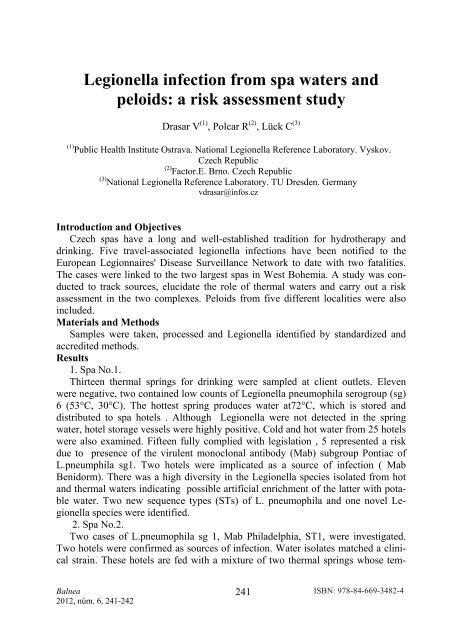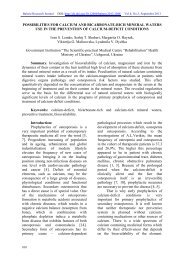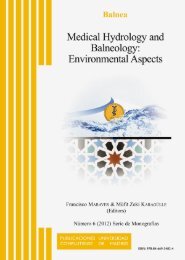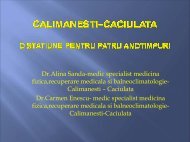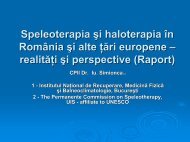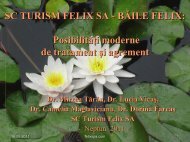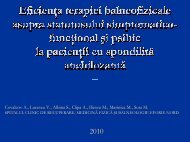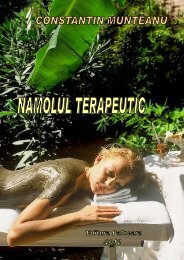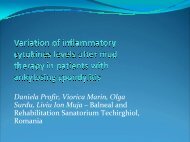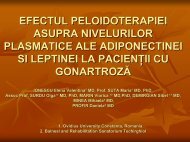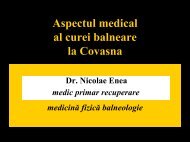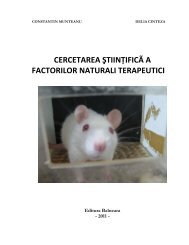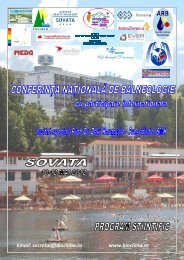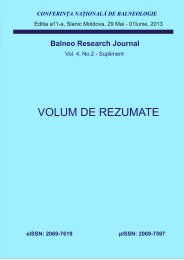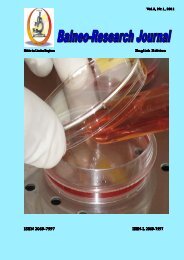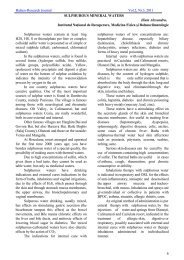- Page 1 and 2:
Balnea ISSN: 978-84-669-3482-4 Núm
- Page 3 and 4:
Balnea 2012, Núm. 6, 9-24 Contents
- Page 5 and 6:
Balnea 2012, Núm. 6, 9-24 Contents
- Page 7 and 8:
Balnea 2012, Núm. 6, 9-24 Contents
- Page 9 and 10:
Balnea 2012, Núm. 6, 9-24 Contents
- Page 11 and 12:
Posters Papers Balnea 2012, Núm. 6
- Page 13 and 14:
Balnea 2012, Núm. 6, 9-24 Contents
- Page 15 and 16:
Balnea 2012, Núm. 6, 9-24 Contents
- Page 17 and 18:
38 th World Congress of the Interna
- Page 19 and 20:
38 th World Congress of the Interna
- Page 21 and 22:
Honorary Committee Honorary Preside
- Page 23:
PROGRAMME
- Page 26 and 27:
34 Medical Hydrology and Balneology
- Page 29:
SCIENTIFIC SESSIONS
- Page 33 and 34:
What’s new in Balneology? Karagü
- Page 35 and 36:
Balneology in Europe: results of a
- Page 37 and 38:
Balneology Research in Germany Gute
- Page 39 and 40:
Balneology Research in France Roque
- Page 41:
The State of art - Session 01 Lectu
- Page 44 and 45:
Medical Hydrology and Balneology: E
- Page 46 and 47:
Health resort therapy (spa therapy)
- Page 48 and 49:
The State of art, Health Resort Med
- Page 50 and 51:
State of the art, Health Resort Med
- Page 52 and 53:
The State of the art, Health Resort
- Page 55 and 56:
Impact of sulphurous water endotymp
- Page 57 and 58:
Balnea 2012, núm. 6, 64-65 Medical
- Page 59 and 60:
Balnea 2012, núm. 6, 66-67 Medical
- Page 61 and 62:
Balnea 2012, núm. 6, 68-69 Medical
- Page 63 and 64:
Balnea 2012, núm. 6, 70-71 Medical
- Page 65 and 66:
Balnea 2012, núm. 6, 72-73 Medical
- Page 67 and 68:
Balnea 2012, núm. 6, 74-75 Medical
- Page 69 and 70:
Balnea 2012, núm. 6, 76-77 Medical
- Page 71:
Methodology of Scientific Investiga
- Page 74 and 75:
Medical Hydrology and Balneology: E
- Page 76 and 77:
Medical Hydrology and Balneology: E
- Page 78 and 79:
Medical Hydrology and Balneology: E
- Page 80 and 81:
Medical Hydrology and Balneology: E
- Page 82 and 83:
Medical Hydrology and Balneology: E
- Page 84 and 85:
Effectiveness the treatments with n
- Page 86 and 87:
Building a preventive medicine mode
- Page 89:
Climatotherapy - Thalassotherapy -
- Page 92 and 93:
Medical Hydrology and Balneology: E
- Page 94 and 95:
Is Thalassotherapy simply a type of
- Page 96 and 97:
Assessment of the impact of weather
- Page 98 and 99:
Marine zootherapy as part of thalas
- Page 100 and 101:
Thalassotherapy and otaridotheraphy
- Page 102 and 103:
Thalasso medical centre in the salt
- Page 104 and 105:
Acute atopic dermatitis and balneot
- Page 106 and 107:
Change of the psoriasis area and se
- Page 109:
Climatotherapy - Dead Sea - Session
- Page 112 and 113:
Ultra-violet (UV) radiation propert
- Page 114 and 115:
Climatotherapy of skin diseases at
- Page 116 and 117:
Medical Hydrology and Balneology: E
- Page 118 and 119:
Medical Hydrology and Balneology: E
- Page 120 and 121:
Influence of single immersion in De
- Page 123:
New Trends 2 - Session 06 Lectures
- Page 126 and 127:
Medical Hydrology and Balneology: E
- Page 128 and 129:
Implementing comprehensive care cli
- Page 130 and 131:
Results 138 Medical Hydrology and B
- Page 132 and 133:
Medical Hydrology and Balneology: E
- Page 134 and 135:
Medical Hydrology and Balneology: E
- Page 136 and 137:
Medical Hydrology and Balneology: E
- Page 138 and 139:
Medical Hydrology and Balneology: E
- Page 140 and 141:
148 Medical Hydrology and Balneolog
- Page 142 and 143:
Thermophysical study of peat from t
- Page 145:
Société Française de Médecine T
- Page 148 and 149:
Therapeutic education programs for
- Page 150 and 151:
Metabolic Syndrome: education progr
- Page 152 and 153:
Development of a therapeutic progra
- Page 154 and 155:
Therapeutic education for patients
- Page 156 and 157:
Withdrawal from benzodiapezines in
- Page 159 and 160:
A proposal for a glossary of peloid
- Page 161 and 162:
Biophysical skin effects of peloids
- Page 163 and 164:
Mud cure in Russia: history, achiev
- Page 165 and 166:
Clinical effects of mud-bath therap
- Page 167 and 168:
Impact of peloidotherapy on hystolo
- Page 169 and 170:
Impact of Mud Therapy in pathogenes
- Page 171 and 172:
Effects of mud-bath applications on
- Page 173 and 174:
Chondrogenic effect of the sulphuri
- Page 175 and 176:
Balneotherapy and mud-therapy in kn
- Page 177:
Biology - Session 09 Lectures Vetri
- Page 180 and 181:
Medical Hydrology and Balneology: E
- Page 182 and 183: Which is better for health promotio
- Page 184 and 185: Heat-shock protein 70 is affected b
- Page 186 and 187: A possible physiological mechanism
- Page 188 and 189: Thermal changes of fingers after co
- Page 190 and 191: Case study: geochemical transformat
- Page 192 and 193: Hydrogen sulfide as an anti-inflama
- Page 194 and 195: Determination of selenium in minera
- Page 196 and 197: Medical Hydrology and Balneology: E
- Page 199 and 200: Scientific Basics of Water and Hydr
- Page 201 and 202: Balnea 2012, núm. 6, 208-209 Medic
- Page 203 and 204: Balnea 2012, núm. 6, 210-211 Medic
- Page 205 and 206: Balnea 2012, núm. 6, 212-213 Medic
- Page 207 and 208: Balnea 2012, núm. 6, 214-215 Medic
- Page 209 and 210: Balnea 2012, núm. 6, 216-217 Medic
- Page 211 and 212: Balnea 2012, núm. 6, 218-219 Medic
- Page 213 and 214: Balnea 2012, núm. 6, 220-222 Medic
- Page 215: Health tourism sustainable - Enviro
- Page 218 and 219: Recent contributions of the Geologi
- Page 220 and 221: Medical Hydrology and Balneology: E
- Page 222 and 223: Medical Hydrology and Balneology: E
- Page 224 and 225: Medical Hydrology and Balneology: E
- Page 227 and 228: Salt rooms and halotherapy in europ
- Page 229 and 230: Meteo-climatic factors influence an
- Page 231: Carbocrenotherapy and the scleroder
- Page 235 and 236: Threats and opportunities facing Fr
- Page 237: Balnea 2012, núm. 6, 244-245 Medic
- Page 240 and 241: Medical Hydrology and Balneology: E
- Page 242 and 243: Medical Hydrology and Balneology: E
- Page 244 and 245: Medical Hydrology and Balneology: E
- Page 246 and 247: Medical Hydrology and Balneology: E
- Page 248 and 249: Medical Hydrology and Balneology: E
- Page 250 and 251: Medical Hydrology and Balneology: E
- Page 252 and 253: Medical Hydrology and Balneology: E
- Page 254 and 255: Medical Hydrology and Balneology: E
- Page 256 and 257: Medical Hydrology and Balneology: E
- Page 259: Miscellaneous - 1 - Session 14 Lect
- Page 262 and 263: Medical Hydrology and Balneology: E
- Page 264 and 265: “Balneo-check”: software for ba
- Page 266 and 267: Medical Hydrology and Balneology: E
- Page 268 and 269: Medical Hydrology and Balneology: E
- Page 270 and 271: Clinical practice and scientific in
- Page 273: Sociedad Española de Hidrología M
- Page 276 and 277: The story of Spanish Society Medica
- Page 278 and 279: Medical Hydrology and Balneology: E
- Page 280 and 281: Medical Hydrology and Balneology: E
- Page 282 and 283:
Medical Hydrology and Balneology: E
- Page 284 and 285:
Medical Hydrology and Balneology: E
- Page 287 and 288:
Medical Hydrology and Climatology T
- Page 289 and 290:
Hippolytus´ house: a roman medical
- Page 291 and 292:
Spatio-cultural sustainability of t
- Page 293 and 294:
An introduction to clinical ethics
- Page 295 and 296:
Influence of sodium alginate on the
- Page 297 and 298:
Bathing in hot water, utilizing ons
- Page 299:
POSTERS PAPERS
- Page 303 and 304:
Omega-6-eicosanoid may be involved
- Page 305 and 306:
Health effects attributed to endocr
- Page 307 and 308:
Underground microclimate influence
- Page 309 and 310:
Carbogaseous mineral water for pati
- Page 311 and 312:
A developing complex research on na
- Page 313 and 314:
An analysis of the behaviour of a m
- Page 315 and 316:
Technical audit of the thermal wate
- Page 317 and 318:
New trends P9 Does balneology still
- Page 319:
Balnea 2012, núm. 6, 325-327 Medic
- Page 322 and 323:
Effectiveness of exercise program f
- Page 324 and 325:
Sulphurous mineral water for lower
- Page 326 and 327:
Salt mines therapy for pulmonary re
- Page 328 and 329:
High concentration artificial CO2-w
- Page 330 and 331:
Hypoxic adaptation in patients with
- Page 332 and 333:
Control of legionella Benhammou S (
- Page 334 and 335:
Puente Viesgo’s spa therapy for p
- Page 336 and 337:
Association of behaviral and psycho
- Page 338 and 339:
Effects of a rehabilitation treatme
- Page 340 and 341:
Water physical therapy is effective
- Page 342 and 343:
Effects on body composition in brea
- Page 344 and 345:
Depression and thermal treatments:
- Page 346 and 347:
Analysis of the effects of a hydrot
- Page 348 and 349:
A comparison land-water environment
- Page 350 and 351:
Medical Hydrology and Balneology: E
- Page 352 and 353:
Medical Hydrology and Balneology: E
- Page 354 and 355:
Medical Hydrology and Balneology: E
- Page 356 and 357:
Medical Hydrology and Balneology: E
- Page 358 and 359:
Aquatic physiotherapy program in pr
- Page 360 and 361:
Physiotherapy and low back pain: ef
- Page 362 and 363:
Musculoskeletal disorders and aquat
- Page 364 and 365:
Nutrition as a potential determinan
- Page 366 and 367:
Medical Hydrology and Balneology: E
- Page 369 and 370:
Magnesium waters from Serbia Jovano
- Page 371 and 372:
Neurological activity of mineral wa
- Page 373:
Diuresis-crenotherapy in reno-urina
- Page 376 and 377:
Medical Hydrology and Balneology: E
- Page 378 and 379:
386 Medical Hydrology and Balneolog
- Page 380 and 381:
Medical Hydrology and Balneology: E
- Page 382 and 383:
Medical Hydrology and Balneology: E
- Page 384 and 385:
Medical Hydrology and Balneology: E
- Page 386 and 387:
Medical Hydrology and Balneology: E
- Page 388 and 389:
Medical Hydrology and Balneology: E
- Page 390 and 391:
Medical Hydrology and Balneology: E
- Page 392 and 393:
Mud therapy resources in Bulgaria I
- Page 394 and 395:
Mud maturation in Copahue, Argentin
- Page 396 and 397:
Efficacy and tolerability of mud pa
- Page 399:
Climatotherapy - Thalassotherapy De
- Page 402 and 403:
Medical Hydrology and Balneology: E
- Page 404 and 405:
Medical Hydrology and Balneology: E
- Page 406 and 407:
Medical Hydrology and Balneology: E
- Page 408 and 409:
Medical Hydrology and Balneology: E
- Page 410 and 411:
Temperature and relative air humidi
- Page 412 and 413:
Medical Hydrology and Balneology: E
- Page 414 and 415:
Medical Hydrology and Balneology: E
- Page 416 and 417:
Medical Hydrology and Balneology: E
- Page 418 and 419:
Medical Hydrology and Balneology: E
- Page 420 and 421:
The medical spa preferences of the
- Page 422 and 423:
Therapeutic indications of the mine
- Page 424 and 425:
Study of density, thermal conductiv
- Page 426 and 427:
Efficency of underwater ultrasound
- Page 428 and 429:
Health workers knowledge about medi
- Page 430 and 431:
Health workers knowledge about medi
- Page 432 and 433:
Historiography of acidulous waters
- Page 434 and 435:
Perception and Knowledge about Baln
- Page 436 and 437:
Splendour and decadence of spa tour
- Page 438 and 439:
Health workers knowledge about medi
- Page 440 and 441:
Aqui o Thermes, cluster thermal aqu
- Page 442 and 443:
Medical Hydrology and Balneology: E
- Page 444 and 445:
Medical Hydrology and Balneology: E
- Page 446 and 447:
Traffic evolution of the website of
- Page 448 and 449:
Medical Hydrology and Balneology: E
- Page 451 and 452:
Abramovic D: 181 Adeagbo JT: 272 Ad
- Page 453 and 454:
Fernández-González MV: 387, 389,
- Page 455 and 456:
Metlak A: 227 Michán A: 102 Mígue
- Page 457:
Vita P: 74 Vitale M: 46, 63 Vitoria


